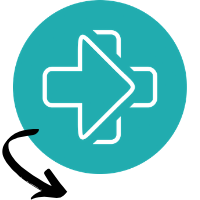How to sleep your way to better health
It's not surprising that two-thirds of adults fail to obtain the recommended eight hours of sleep each night but the consequences of this are alarming.
Can you recall the last time you woke up without an alarm clock feeling refreshed, not needing caffeine?
Direct Primary Care of Oklahoma is membership based health clinic committed to providing comprehensive, affordable family medicine care. You deserve a health care model that puts your needs first, we can help.
The effects of routinely sleeping less than six to seven hours a night:
Demolishes the immune system.
More than doubles your risk of cancer.
Can elevate blood pressure and increase your risk for coronary artery disease.
Disrupts blood glucose (sugar) levels which can contribute to diabetes.
Affects mental health and is inked with depression, anxiety, and suicidality.
Contributes to weight gain and obesity.
In men, lowers testosterone levels.
In women, increases risk for abnormal menstrual cycles and decreased fertility.
Four Pillars of Sleep
Regularity
How consistent is your sleep?
Do you have a regular bed time and wake time?
Is your sleep schedule disrupted by shift work or jet lag?
Continuity
Are you sleeping straight through the night?
Is your sleep fragmented by night awakenings?
Quantity
How much total sleep are you getting?
Quality
Are you getting appropriate deep sleep?
Twelve tips for healthy sleep:
1. Stick to a sleep schedule.
Set an alarm for bedtime time to keep a consistent routine.
Sleeping later on weekends won't fully make up for a lack of sleep during the week and will make it harder to wake up early on Monday.
2. Exercise, but not too late in the day.
Try to exercise at least thirty minutes on most days but not later than two to three hours before your bedtime.
3. Avoid caffeine.
The stimulant effects of caffeine can take up to eight hours to wear off fully. A cup of coffee in the later afternoon can make it hard to fall asleep at night.
4. Avoid alcoholic drinks before bed.
While alcohol may help you relax, it can keep you in the lighter stage of sleep, robbing you of REM sleep and leading to night awakenings when the effects of the alcohol have worm off.
5. Avoid large meals and beverages late at night.
Large meals can cause indigestion which interferes with sleep and drinking too many fluids can cause frequent awakenings to urinate.
6. If possible, avoid medicines that delay or disrupt your sleep.
Some prescription and over-the-counter medications can disrupt sleep patterns. When appropriate, these may be taken at other times of the day.
7. Don't take naps after 3 p.m.
Short naps of 20-30 minutes are okay, but late afternoon naps can make it harder to fall asleep at night.
8. Relax before bed.
A relaxing activity, such as reading or listening to music, should be part of your bedtime routine.
9. Take a hot bath before bed.
Baths can help you relax and the drop in body temperature after getting our of the bath may help you feel sleepy.
10. Keep a dark, cool, gadget-free bedroom.
Get rid of anything in your bedroom that might distract you from sleep.
Cool temperatures promote better sleep.
LED and blue lights from TVs, cell phones, and computers disrupt healthy sleep cycles.
11. Have the right sunlight exposure.
Getting 30-60 minutes of sunlight exposure in the mornings and turning down lights before bedtime helps regulate daily sleep patterns.
12. Don't lie in bed awake.
If you find yourself awake for more than 20 minutes or if you are feeling anxious, get up and do some relaxing activity until you feel sleepy.
Did you know?
According to a study in the British Medical Journal, the Monday following spring daylight savings time change is associated with a 24% increase in heart attacks. The Tuesday following fall daylight savings time change is associated with a 21% reduction in heart attacks. These statistics highlighting the health potential of just one hour of sleep.
For your health,
Terry Rimmer, MD
Get the latest health news and updates sent directly to your email for free!




